Module 3 Unit 2 On Monday I'll go swimming 教案(含反思)
文档属性
| 名称 | Module 3 Unit 2 On Monday I'll go swimming 教案(含反思) | 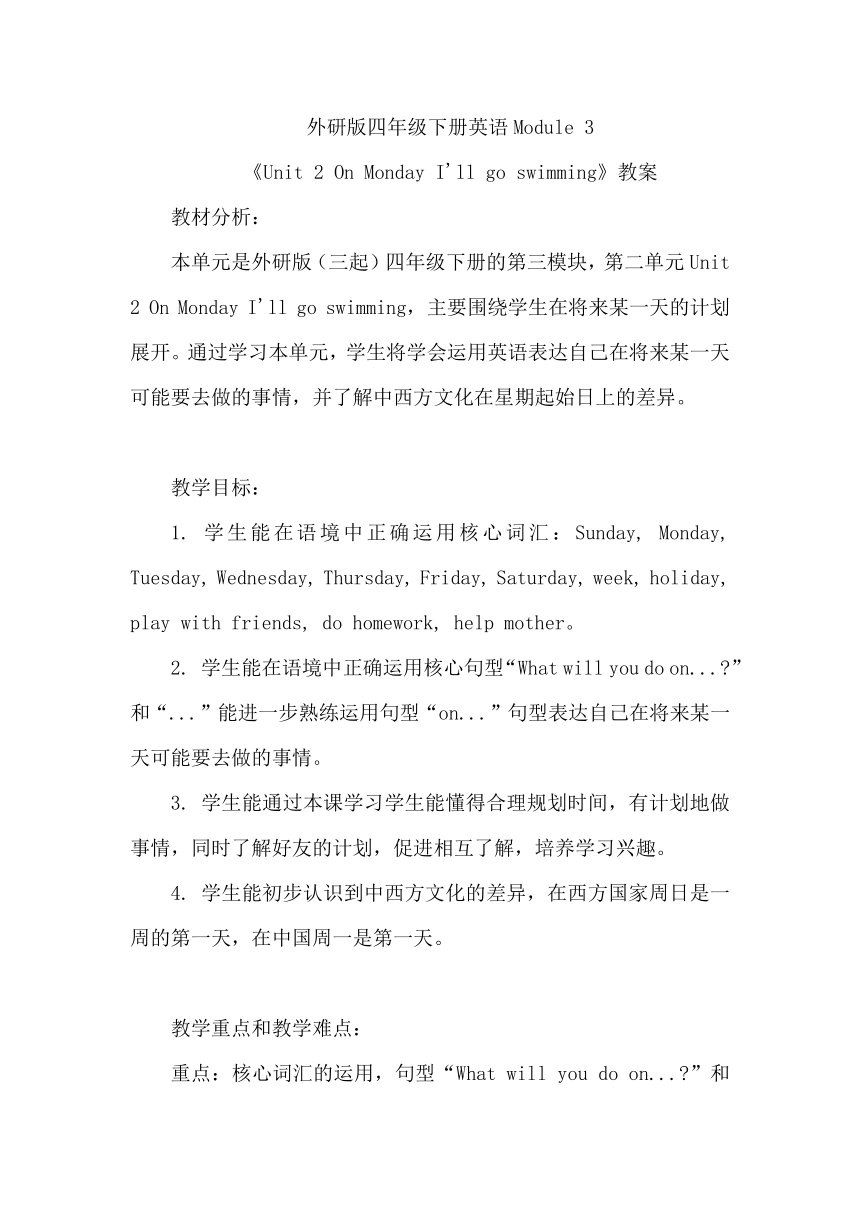 | |
| 格式 | docx | ||
| 文件大小 | 15.2KB | ||
| 资源类型 | 教案 | ||
| 版本资源 | 外研版(三年级起点) | ||
| 科目 | 英语 | ||
| 更新时间 | 2024-03-11 10:44:03 | ||
图片预览

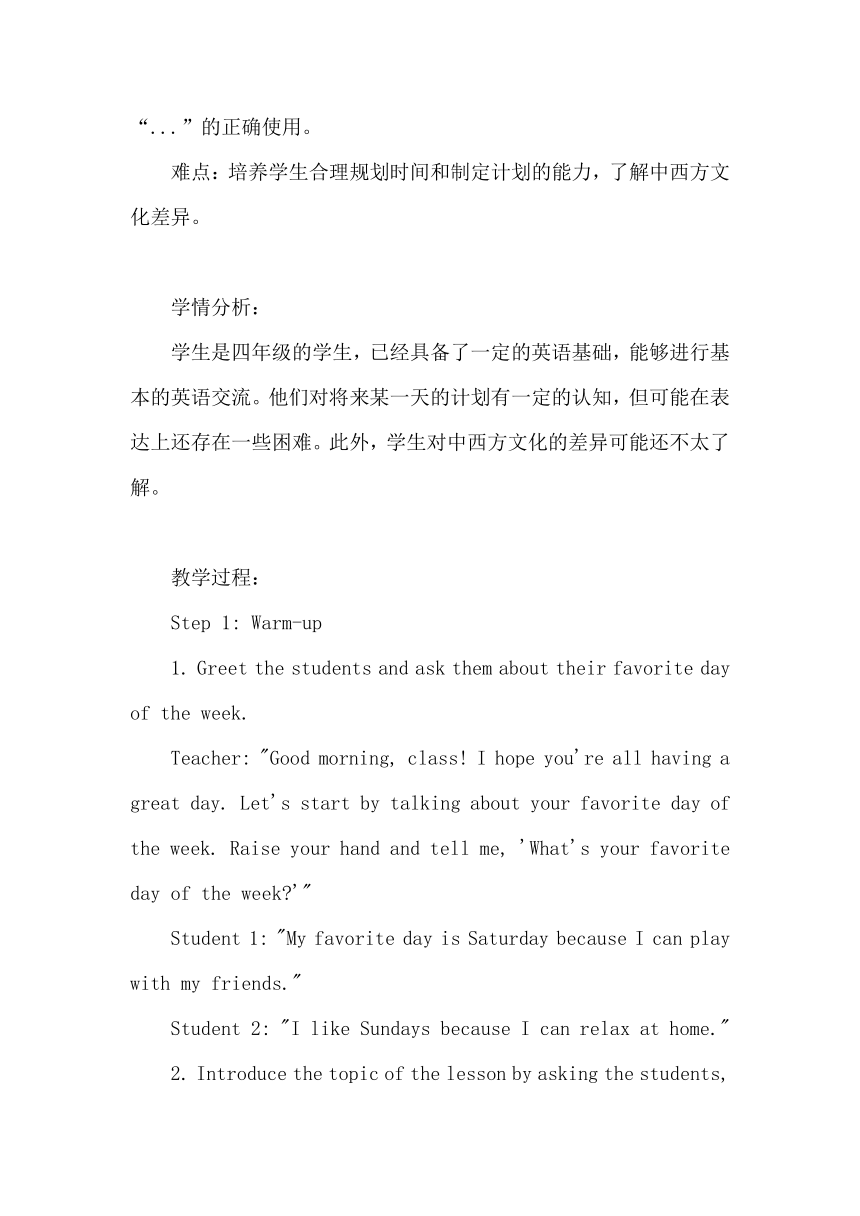
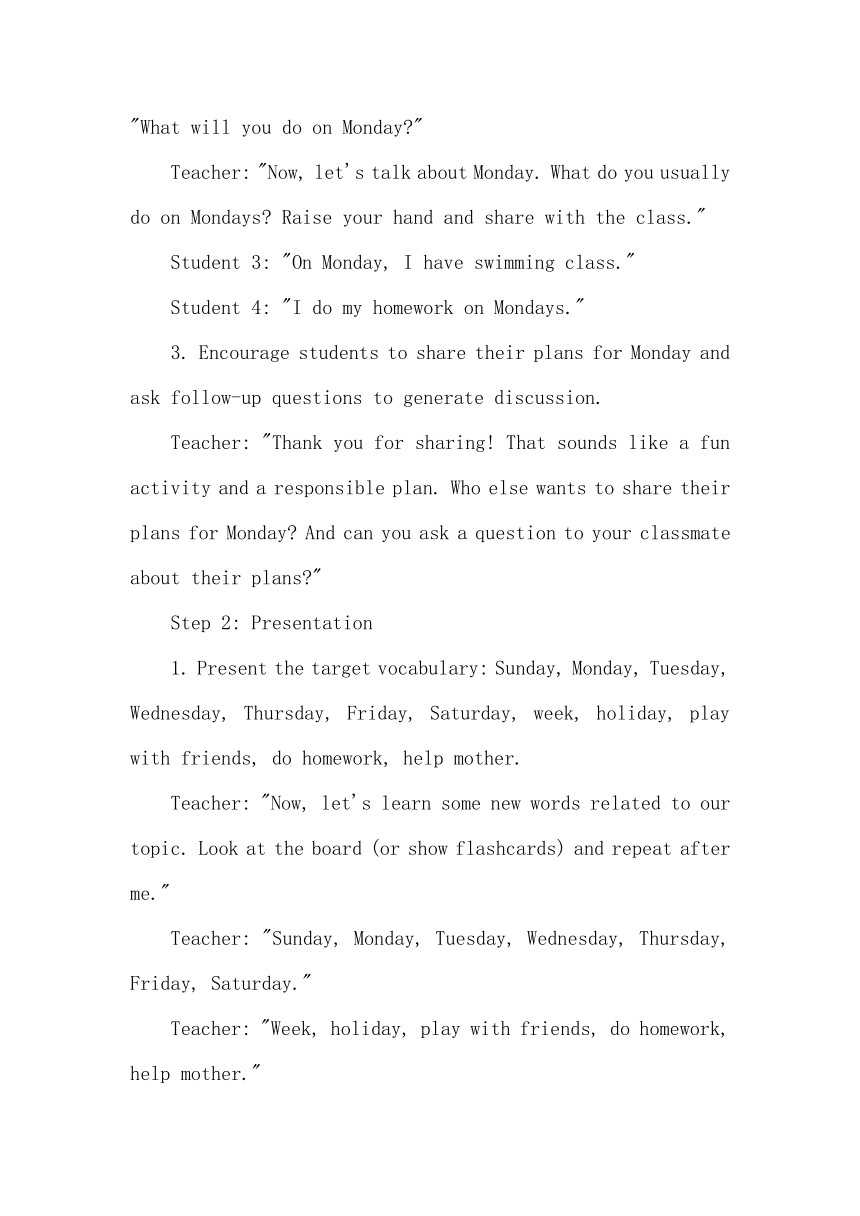
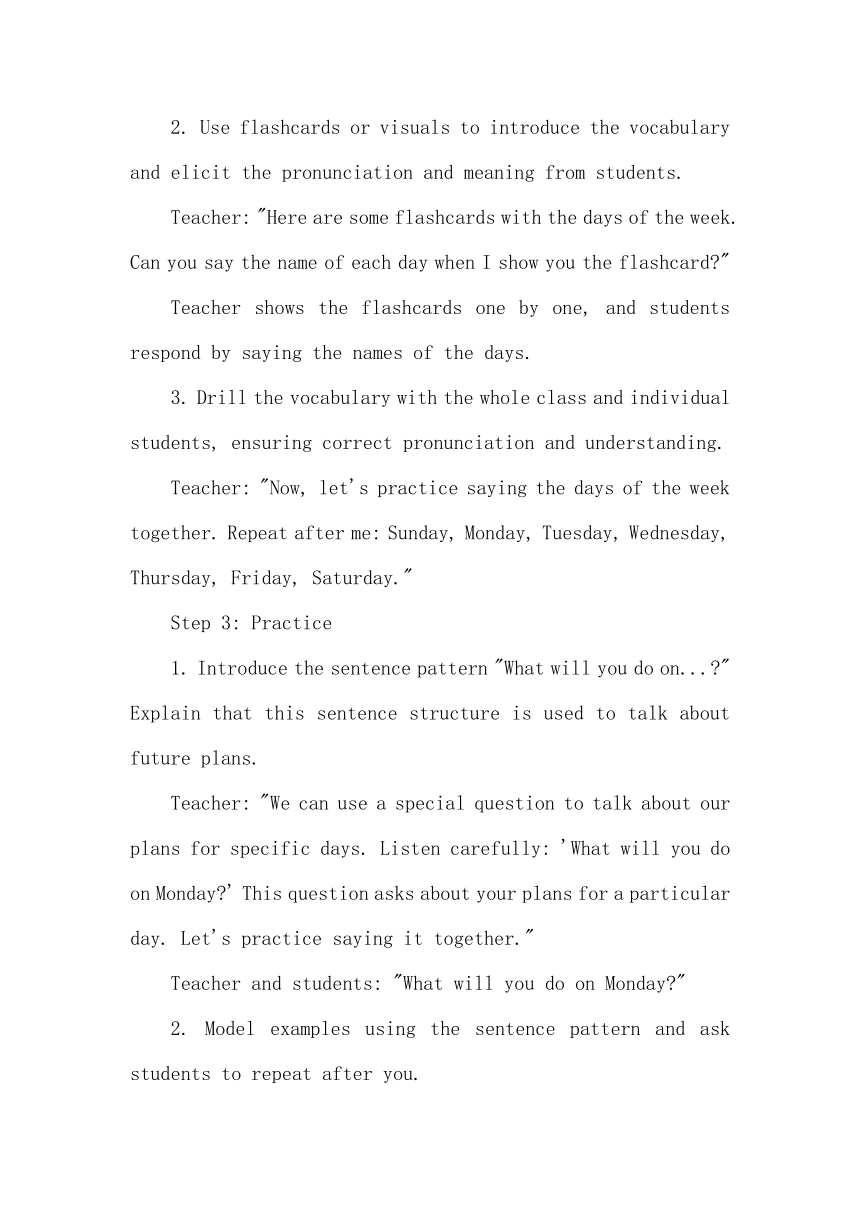
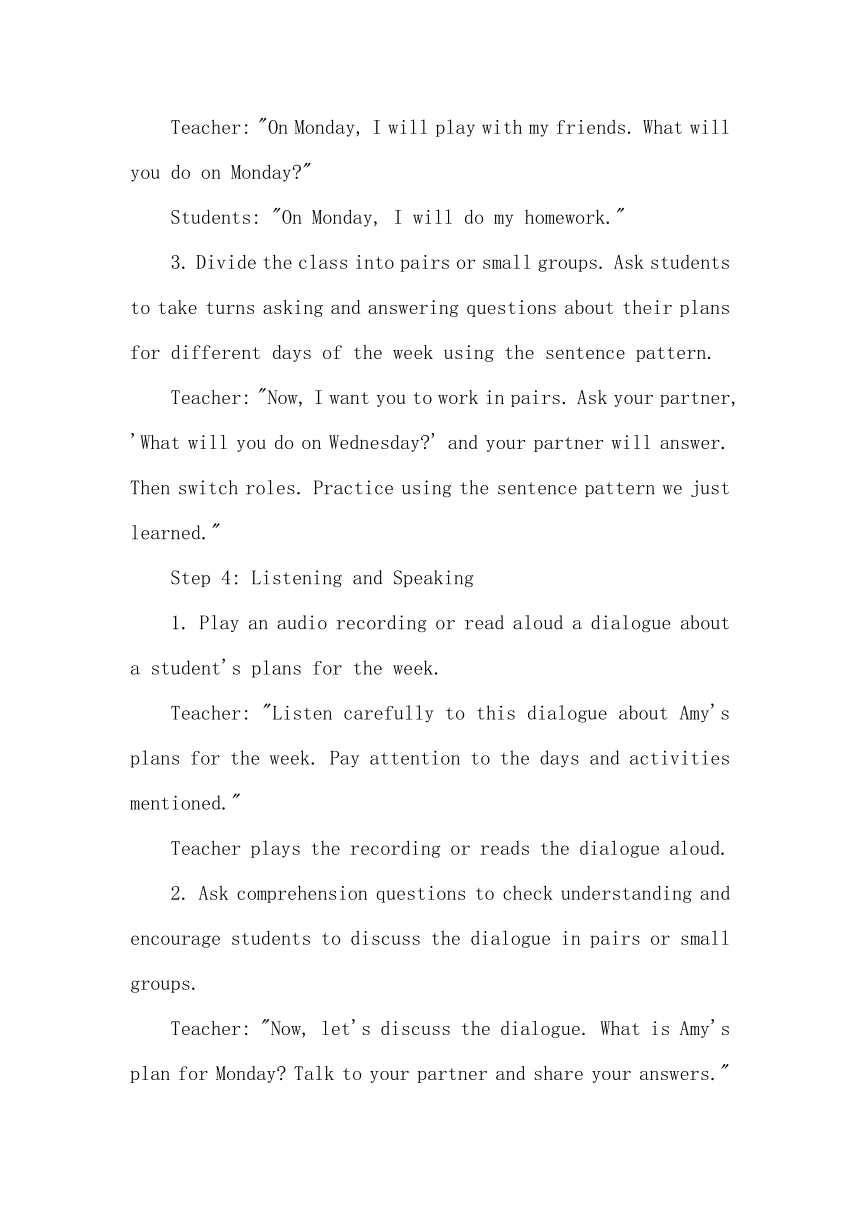
文档简介
外研版四年级下册英语Module 3
《Unit 2 On Monday I'll go swimming》教案
教材分析:
本单元是外研版(三起)四年级下册的第三模块,第二单元Unit 2 On Monday I'll go swimming,主要围绕学生在将来某一天的计划展开。通过学习本单元,学生将学会运用英语表达自己在将来某一天可能要去做的事情,并了解中西方文化在星期起始日上的差异。
教学目标:
1. 学生能在语境中正确运用核心词汇:Sunday, Monday, Tuesday, Wednesday, Thursday, Friday, Saturday, week, holiday, play with friends, do homework, help mother。
2. 学生能在语境中正确运用核心句型“What will you do on... ”和“...”能进一步熟练运用句型“on...”句型表达自己在将来某一天可能要去做的事情。
3. 学生能通过本课学习学生能懂得合理规划时间,有计划地做事情,同时了解好友的计划,促进相互了解,培养学习兴趣。
4. 学生能初步认识到中西方文化的差异,在西方国家周日是一周的第一天,在中国周一是第一天。
教学重点和教学难点:
重点:核心词汇的运用,句型“What will you do on... ”和“...”的正确使用。
难点:培养学生合理规划时间和制定计划的能力,了解中西方文化差异。
学情分析:
学生是四年级的学生,已经具备了一定的英语基础,能够进行基本的英语交流。他们对将来某一天的计划有一定的认知,但可能在表达上还存在一些困难。此外,学生对中西方文化的差异可能还不太了解。
教学过程:
Step 1: Warm-up
1. Greet the students and ask them about their favorite day of the week.
Teacher: "Good morning, class! I hope you're all having a great day. Let's start by talking about your favorite day of the week. Raise your hand and tell me, 'What's your favorite day of the week '"
Student 1: "My favorite day is Saturday because I can play with my friends."
Student 2: "I like Sundays because I can relax at home."
2. Introduce the topic of the lesson by asking the students, "What will you do on Monday "
Teacher: "Now, let's talk about Monday. What do you usually do on Mondays Raise your hand and share with the class."
Student 3: "On Monday, I have swimming class."
Student 4: "I do my homework on Mondays."
3. Encourage students to share their plans for Monday and ask follow-up questions to generate discussion.
Teacher: "Thank you for sharing! That sounds like a fun activity and a responsible plan. Who else wants to share their plans for Monday And can you ask a question to your classmate about their plans "
Step 2: Presentation
1. Present the target vocabulary: Sunday, Monday, Tuesday, Wednesday, Thursday, Friday, Saturday, week, holiday, play with friends, do homework, help mother.
Teacher: "Now, let's learn some new words related to our topic. Look at the board (or show flashcards) and repeat after me."
Teacher: "Sunday, Monday, Tuesday, Wednesday, Thursday, Friday, Saturday."
Teacher: "Week, holiday, play with friends, do homework, help mother."
2. Use flashcards or visuals to introduce the vocabulary and elicit the pronunciation and meaning from students.
Teacher: "Here are some flashcards with the days of the week. Can you say the name of each day when I show you the flashcard "
Teacher shows the flashcards one by one, and students respond by saying the names of the days.
3. Drill the vocabulary with the whole class and individual students, ensuring correct pronunciation and understanding.
Teacher: "Now, let's practice saying the days of the week together. Repeat after me: Sunday, Monday, Tuesday, Wednesday, Thursday, Friday, Saturday."
Step 3: Practice
1. Introduce the sentence pattern "What will you do on... " Explain that this sentence structure is used to talk about future plans.
Teacher: "We can use a special question to talk about our plans for specific days. Listen carefully: 'What will you do on Monday ' This question asks about your plans for a particular day. Let's practice saying it together."
Teacher and students: "What will you do on Monday "
2. Model examples using the sentence pattern and ask students to repeat after you.
Teacher: "On Monday, I will play with my friends. What will you do on Monday "
Students: "On Monday, I will do my homework."
3. Divide the class into pairs or small groups. Ask students to take turns asking and answering questions about their plans for different days of the week using the sentence pattern.
Teacher: "Now, I want you to work in pairs. Ask your partner, 'What will you do on Wednesday ' and your partner will answer. Then switch roles. Practice using the sentence pattern we just learned."
Step 4: Listening and Speaking
1. Play an audio recording or read aloud a dialogue about a student's plans for the week.
Teacher: "Listen carefully to this dialogue about Amy's plans for the week. Pay attention to the days and activities mentioned."
Teacher plays the recording or reads the dialogue aloud.
2. Ask comprehension questions to check understanding and encourage students to discuss the dialogue in pairs or small groups.
Teacher: "Now, let's discuss the dialogue. What is Amy's plan for Monday Talk to your partner and share your answers."
Students discuss in pairs or small groups and share their answers.
3. Pair students up and have them create their own dialogues using the sentence pattern and the vocabulary they have learned.
Teacher: "Now, with your partner, create your own dialogue about your plans for the week. Use the sentence pattern and vocabulary we've practiced. Take turns asking and answering questions. Be ready to share your dialogues with the class."
Step 5: Cultural Awareness
1. Introduce the cultural difference between Western countries and China regarding the starting day of the week (Sunday vs. Monday).
Teacher: "Did you know that different countries have different ways of counting the days of the week In Western countries, Sunday is considered the first day of the week, while in China, Monday is often considered the first day of the week."
2. Show pictures or use visual aids to help students understand the concept and emphasize the cultural diversity.
Teacher: "Look at these pictures. In Western calendars, Sunday is shown as the first day of the week, while in Chinese calendars, Monday is shown as the first day. This is an interesting cultural difference."
Teacher shows pictures or visual aids depicting Western and Chinese calendars.
3. Facilitate a short discussion about the cultural differences and ask students to share their thoughts and experiences related to this topic.
Teacher: "What do you think about this cultural difference Do you prefer starting the week on Sunday or Monday Share your thoughts with the class."
Students share their opinions and experiences related to the cultural difference, fostering a brief discussion.
Step 6: Consolidation
1. Review the target vocabulary and sentence pattern by conducting a quick quiz or game.
Teacher: "Let's review what we've learned so far. I will say a day of the week, and you tell me the activity you would do on that day. For example, if I say 'Sunday,' you can say 'play with friends.' Are you ready "
Teacher asks questions like "What will you do on Monday " and students respond with appropriate answers using the target vocabulary and sentence pattern.
2. Ask students to write down their plans for the week using the sentence pattern "On [day], I will [activity]."
Teacher: "Now, take out your notebooks and write down your plans for the week. Use the sentence pattern we've practiced. Start each sentence with 'On [day], I will [activity].' Take your time and be creative with your plans."
Students write their plans individually.
3. Provide feedback and correct any mistakes or misunderstandings.
Teacher circulates the classroom, checks students' written plans, and provides feedback. If necessary, the teacher corrects any mistakes or clarifies any misunderstandings.
Step 7: Summary and Reflection
1. Summarize the key points covered in the lesson, including the vocabulary, sentence pattern, and cultural awareness.
Teacher: "In today's lesson, we learned about the days of the week, future plans using the sentence pattern 'What will you do on... ' and the cultural difference between Western countries and China regarding the starting day of the week."
Teacher briefly recaps the target vocabulary, sentence pattern, and cultural awareness.
2. Ask students to reflect on what they have learned and share any new insights or understanding they gained.
Teacher: "Now, take a moment to think about what you've learned today. Can you share one thing you found interesting or one new thing you learned "
Students reflect and share their insights or new learnings with the class.
3. Provide positive feedback and encourage students to continue practicing their English skills.
Teacher: "Great job, everyone! I'm impressed with your participation and progress. Keep practicing your English skills, and I'm sure you'll become even better. Have a wonderful day!"
板书设计:
Sunday Monday Tuesday Wednesday Thursday Friday Saturday
What will you do on...
On [day], I will [activity].
教学反思:
本节课通过多种教学活动,如词汇教学、句型练习、听说训练和文化意识培养等,帮助学生学会运用核心词汇和句型,能够在语境中表达自己在将来某一天的计划。同时,学生也对中西方文化的差异有了初步的认识。在教学过程中,学生积极参与,合作互动,课堂氛围活跃。然而,需要注意的是确保学生对句型和词汇的掌握程度,及时给予反馈和纠正。同时,鼓励学生多进行口语练习,提高语言表达能力。
《Unit 2 On Monday I'll go swimming》教案
教材分析:
本单元是外研版(三起)四年级下册的第三模块,第二单元Unit 2 On Monday I'll go swimming,主要围绕学生在将来某一天的计划展开。通过学习本单元,学生将学会运用英语表达自己在将来某一天可能要去做的事情,并了解中西方文化在星期起始日上的差异。
教学目标:
1. 学生能在语境中正确运用核心词汇:Sunday, Monday, Tuesday, Wednesday, Thursday, Friday, Saturday, week, holiday, play with friends, do homework, help mother。
2. 学生能在语境中正确运用核心句型“What will you do on... ”和“...”能进一步熟练运用句型“on...”句型表达自己在将来某一天可能要去做的事情。
3. 学生能通过本课学习学生能懂得合理规划时间,有计划地做事情,同时了解好友的计划,促进相互了解,培养学习兴趣。
4. 学生能初步认识到中西方文化的差异,在西方国家周日是一周的第一天,在中国周一是第一天。
教学重点和教学难点:
重点:核心词汇的运用,句型“What will you do on... ”和“...”的正确使用。
难点:培养学生合理规划时间和制定计划的能力,了解中西方文化差异。
学情分析:
学生是四年级的学生,已经具备了一定的英语基础,能够进行基本的英语交流。他们对将来某一天的计划有一定的认知,但可能在表达上还存在一些困难。此外,学生对中西方文化的差异可能还不太了解。
教学过程:
Step 1: Warm-up
1. Greet the students and ask them about their favorite day of the week.
Teacher: "Good morning, class! I hope you're all having a great day. Let's start by talking about your favorite day of the week. Raise your hand and tell me, 'What's your favorite day of the week '"
Student 1: "My favorite day is Saturday because I can play with my friends."
Student 2: "I like Sundays because I can relax at home."
2. Introduce the topic of the lesson by asking the students, "What will you do on Monday "
Teacher: "Now, let's talk about Monday. What do you usually do on Mondays Raise your hand and share with the class."
Student 3: "On Monday, I have swimming class."
Student 4: "I do my homework on Mondays."
3. Encourage students to share their plans for Monday and ask follow-up questions to generate discussion.
Teacher: "Thank you for sharing! That sounds like a fun activity and a responsible plan. Who else wants to share their plans for Monday And can you ask a question to your classmate about their plans "
Step 2: Presentation
1. Present the target vocabulary: Sunday, Monday, Tuesday, Wednesday, Thursday, Friday, Saturday, week, holiday, play with friends, do homework, help mother.
Teacher: "Now, let's learn some new words related to our topic. Look at the board (or show flashcards) and repeat after me."
Teacher: "Sunday, Monday, Tuesday, Wednesday, Thursday, Friday, Saturday."
Teacher: "Week, holiday, play with friends, do homework, help mother."
2. Use flashcards or visuals to introduce the vocabulary and elicit the pronunciation and meaning from students.
Teacher: "Here are some flashcards with the days of the week. Can you say the name of each day when I show you the flashcard "
Teacher shows the flashcards one by one, and students respond by saying the names of the days.
3. Drill the vocabulary with the whole class and individual students, ensuring correct pronunciation and understanding.
Teacher: "Now, let's practice saying the days of the week together. Repeat after me: Sunday, Monday, Tuesday, Wednesday, Thursday, Friday, Saturday."
Step 3: Practice
1. Introduce the sentence pattern "What will you do on... " Explain that this sentence structure is used to talk about future plans.
Teacher: "We can use a special question to talk about our plans for specific days. Listen carefully: 'What will you do on Monday ' This question asks about your plans for a particular day. Let's practice saying it together."
Teacher and students: "What will you do on Monday "
2. Model examples using the sentence pattern and ask students to repeat after you.
Teacher: "On Monday, I will play with my friends. What will you do on Monday "
Students: "On Monday, I will do my homework."
3. Divide the class into pairs or small groups. Ask students to take turns asking and answering questions about their plans for different days of the week using the sentence pattern.
Teacher: "Now, I want you to work in pairs. Ask your partner, 'What will you do on Wednesday ' and your partner will answer. Then switch roles. Practice using the sentence pattern we just learned."
Step 4: Listening and Speaking
1. Play an audio recording or read aloud a dialogue about a student's plans for the week.
Teacher: "Listen carefully to this dialogue about Amy's plans for the week. Pay attention to the days and activities mentioned."
Teacher plays the recording or reads the dialogue aloud.
2. Ask comprehension questions to check understanding and encourage students to discuss the dialogue in pairs or small groups.
Teacher: "Now, let's discuss the dialogue. What is Amy's plan for Monday Talk to your partner and share your answers."
Students discuss in pairs or small groups and share their answers.
3. Pair students up and have them create their own dialogues using the sentence pattern and the vocabulary they have learned.
Teacher: "Now, with your partner, create your own dialogue about your plans for the week. Use the sentence pattern and vocabulary we've practiced. Take turns asking and answering questions. Be ready to share your dialogues with the class."
Step 5: Cultural Awareness
1. Introduce the cultural difference between Western countries and China regarding the starting day of the week (Sunday vs. Monday).
Teacher: "Did you know that different countries have different ways of counting the days of the week In Western countries, Sunday is considered the first day of the week, while in China, Monday is often considered the first day of the week."
2. Show pictures or use visual aids to help students understand the concept and emphasize the cultural diversity.
Teacher: "Look at these pictures. In Western calendars, Sunday is shown as the first day of the week, while in Chinese calendars, Monday is shown as the first day. This is an interesting cultural difference."
Teacher shows pictures or visual aids depicting Western and Chinese calendars.
3. Facilitate a short discussion about the cultural differences and ask students to share their thoughts and experiences related to this topic.
Teacher: "What do you think about this cultural difference Do you prefer starting the week on Sunday or Monday Share your thoughts with the class."
Students share their opinions and experiences related to the cultural difference, fostering a brief discussion.
Step 6: Consolidation
1. Review the target vocabulary and sentence pattern by conducting a quick quiz or game.
Teacher: "Let's review what we've learned so far. I will say a day of the week, and you tell me the activity you would do on that day. For example, if I say 'Sunday,' you can say 'play with friends.' Are you ready "
Teacher asks questions like "What will you do on Monday " and students respond with appropriate answers using the target vocabulary and sentence pattern.
2. Ask students to write down their plans for the week using the sentence pattern "On [day], I will [activity]."
Teacher: "Now, take out your notebooks and write down your plans for the week. Use the sentence pattern we've practiced. Start each sentence with 'On [day], I will [activity].' Take your time and be creative with your plans."
Students write their plans individually.
3. Provide feedback and correct any mistakes or misunderstandings.
Teacher circulates the classroom, checks students' written plans, and provides feedback. If necessary, the teacher corrects any mistakes or clarifies any misunderstandings.
Step 7: Summary and Reflection
1. Summarize the key points covered in the lesson, including the vocabulary, sentence pattern, and cultural awareness.
Teacher: "In today's lesson, we learned about the days of the week, future plans using the sentence pattern 'What will you do on... ' and the cultural difference between Western countries and China regarding the starting day of the week."
Teacher briefly recaps the target vocabulary, sentence pattern, and cultural awareness.
2. Ask students to reflect on what they have learned and share any new insights or understanding they gained.
Teacher: "Now, take a moment to think about what you've learned today. Can you share one thing you found interesting or one new thing you learned "
Students reflect and share their insights or new learnings with the class.
3. Provide positive feedback and encourage students to continue practicing their English skills.
Teacher: "Great job, everyone! I'm impressed with your participation and progress. Keep practicing your English skills, and I'm sure you'll become even better. Have a wonderful day!"
板书设计:
Sunday Monday Tuesday Wednesday Thursday Friday Saturday
What will you do on...
On [day], I will [activity].
教学反思:
本节课通过多种教学活动,如词汇教学、句型练习、听说训练和文化意识培养等,帮助学生学会运用核心词汇和句型,能够在语境中表达自己在将来某一天的计划。同时,学生也对中西方文化的差异有了初步的认识。在教学过程中,学生积极参与,合作互动,课堂氛围活跃。然而,需要注意的是确保学生对句型和词汇的掌握程度,及时给予反馈和纠正。同时,鼓励学生多进行口语练习,提高语言表达能力。
同课章节目录
- Module 1
- Unit 1 She's a nice teache
- Unit 2 He's cool.
- Module 2
- Unit 1 London is a big city.
- Unit 2 It's very old.
- Module 3
- Unit 1 Robots will do everything.
- Unit 2 On Monday I'll go swimming.
- Module 4
- Unit 1 Will you take your kite?
- Unit 2 Will it be hot in Haikou?
- Module 5
- Unit 1 I was two then.
- Unit 2 They were young.
- Module 6
- Unit 1 Were you at home yesterday?
- Unit 2 Was it a big city then ?
- Module 7
- Unit 1 I helped Mum.
- Unit 2 Grandma cooked fish.
- Module 8
- Unit 1 They sang beautifully.
- Unit 2 I took some pictures.
- Module 9
- Unit 1 Did he live in New York ?
- Unit 2 Did you have a nice holiday?
- Review Module
- Unit 1
- Unit 2
- Module 10
- Unit 1 Did you fall off your bike?
- Unit 2 Sam had lots of chocolate.
